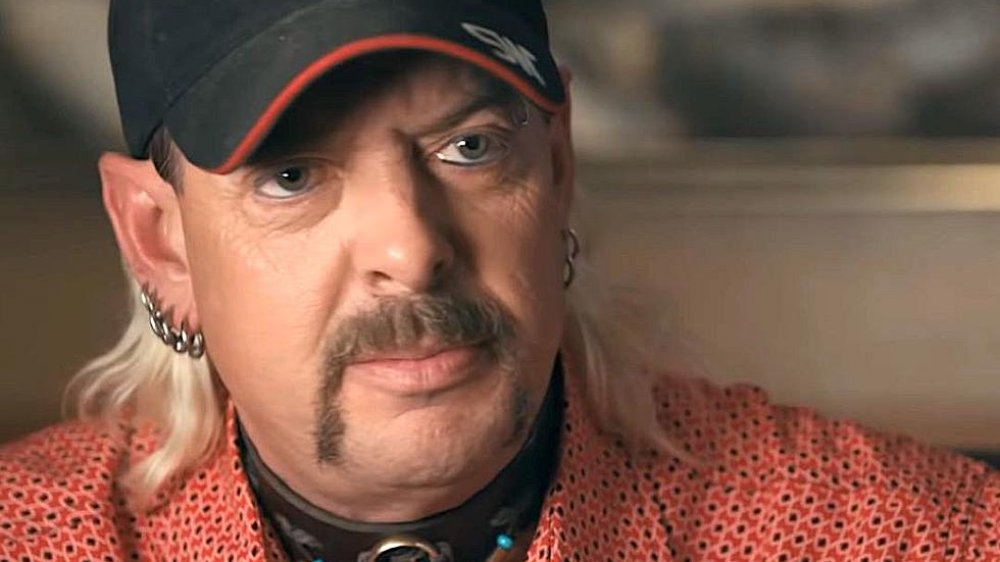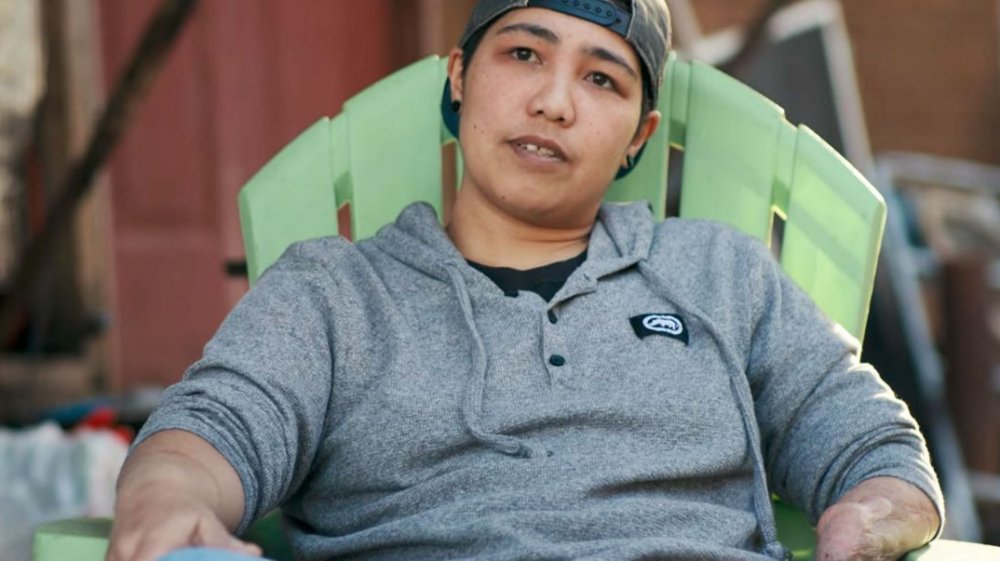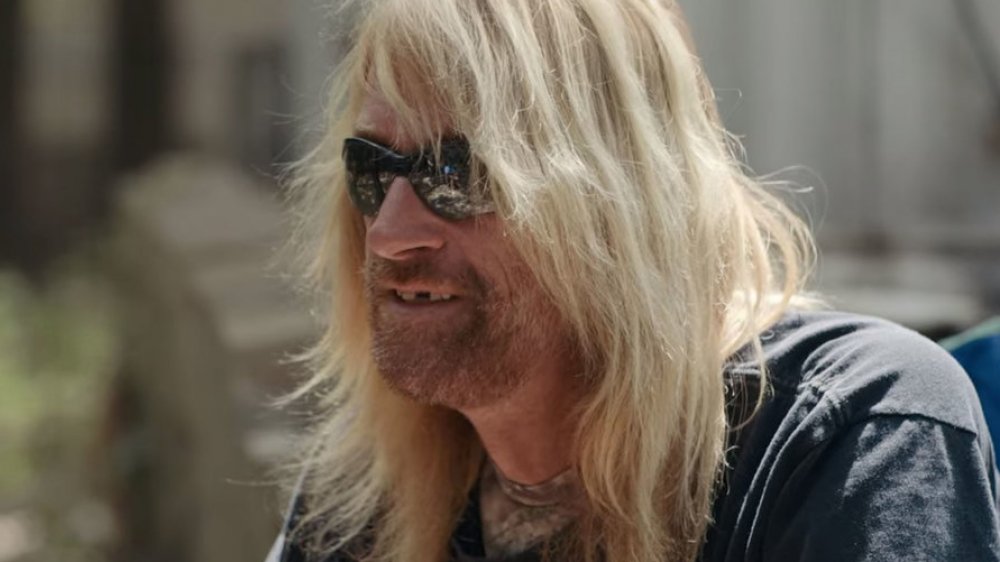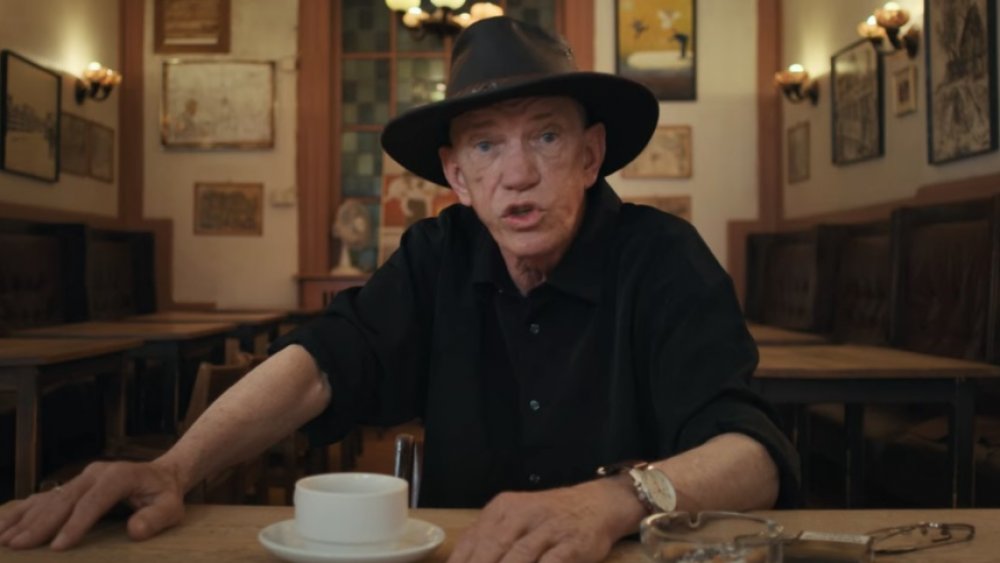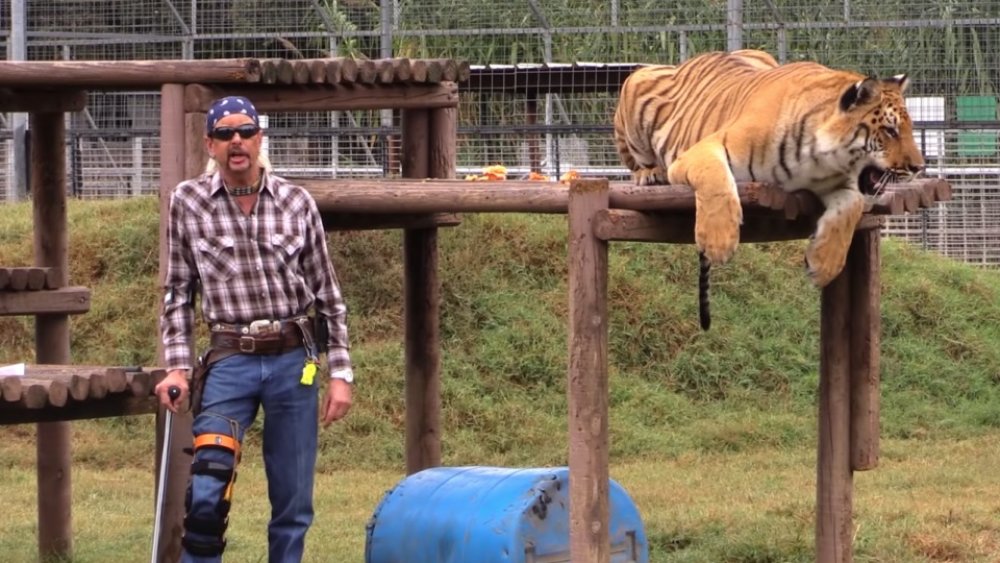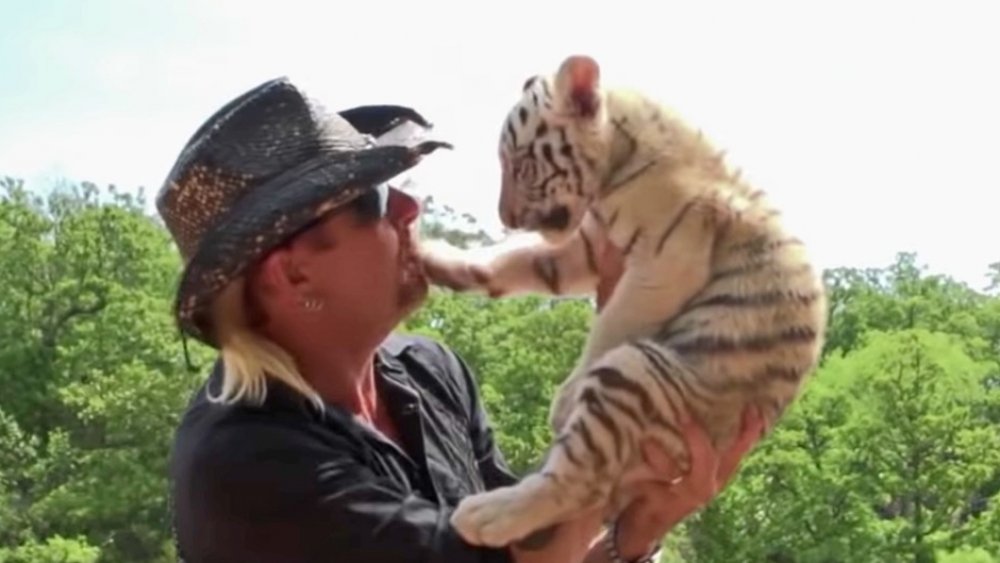The Real Reason Joe Exotic's Staff Couldn't Stand Him
Netflix's new hit docuseries Tiger King: Murder, Mayhem and Madness about the rise and fall of its titular character Joe "Exotic" Maldonado-Passage — a gay, gun-toting, country-singing zoo owner sentenced to 22 years in prison for a murder-for-hire plot to kill rival and animal activist Carole Baskin — is one of those few brilliant pieces of art (or at least, totally bonkers pieces of art) that, in the end, leaves us with more questions than answers. While some are a bit more pressing — like the fate of the animals the documentary so rarely focuses on — we still have so many, many more.
For instance, why was Joe's former husband John Finlay always shirtless during interviews? Did Exotic (born Joseph Schreibvogel) think his lip-syncing actually looked authentic in his tiger-themed country music videos? Why the heck did he run for president? And what did the employees of the Tiger King's Greater Wynnewood Exotic Animal Park really think of him?
For former employees, 'Tiger King' only breaches the surface
Over the course of Tiger King's seven jam-packed episodes — each containing a dizzying panoply of tangential plotlines and eccentric characters — viewers are given an inside glimpse as to what it was like to work for Joe Exotic through interviews with former employees.
Among those featured are Kelci "Saff" Saffery, a staffer who had his arm ripped nearly off by one of the zoo's tigers and returned to work only five days after it was surgically amputated; John Reinke, who lost both of his legs during a zip-lining accident and worked as the park's manager for almost a decade; Rick Kirkham, a former Inside Edition reporter and recovering drug addict, who was hired to create and produce a (failed) reality TV series about Exotic's larger-than-life antics; and former head zookeeper Erik Cowie, who witnessed the darker activities that went on within the zoo's premises. Those activities included illegal cub breeding and the killing of tigers when they became too expensive to care for.
But what about employees that weren't featured in the documentary? Have any others spoken out about what they really thought about Joe Exotic? If so, why weren't they also featured? Let's dive in and find out.
Ex-employees 'feared harm' from Joe Exotic
While the popularity of Tiger King cemented Joe Exotic as an instant cultural icon, the series was far from the first to profile the animal-obsessed provocateur. A handful of profiles published in reputed news outlets and magazines — among them the Daily Beast, Texas Monthly, and New York magazine — chronicled the rise and fall of the man behind the G.W. Zoo and his plot to have Carole Baskin, owner of the Florida-based Big Cat Animal Rescue, assassinated over her attempts to shut down Exotic's more unseemly activities.
Many of these exposés feature first-person accounts from former employees who chose to remain anonymous. The reason for anonymity? According to the Daily Beast, they "[still feared] Joe's power to harm them."
This fear was not unwarranted. Per the Daily Beast (and as the docuseries eventually reveals, albeit briefly), Exotic reportedly poached vulnerable populations — mostly drug addicts and the homeless — to work in his zoo, with promises of three squares a day, a roof over their head, and money in their pockets. In reality, Exotic paid his staff as little as $150 a week and kept them in ramshackle trailers, many of which were rife with insects and vermin.
Joe Exotic's employees were 'in a trance-like state'
New employees were groomed to both rely on and fear Joe Exotic. As the Daily Beast reported, Exotic's reign over his workers was autocratic to a deeply malicious degree: He controlled where and when they slept, and he became their sole source for food and shelter. If Exotic caught any of his employees breaking the rules, however minor, punishments could range from having food rations withheld to being threatened by ending up on the wrong side of one of Joe's many guns, which were fired at them as a scare tactic (though seemingly never hit).
Some employees were kicked out of the park entirely for simply fraternizing with coworkers, rendering them homeless and isolated from the only community they had. As Rick Kirkham, the former producer of Exotic's defunct reality show and YouTube live stream JoeExoticTV, told the Daily Beast, "Employees could not leave the park. They were totally in a trance-like state."
Kirkham wasn't the only one who felt that Exotic had a Svengali-like hold on his workers; it was apparent even to those who were outside of the fold. "[Joe] had it in John's head that if he left, he couldn't go nowhere," an unnamed ex-girlfriend of John Finlay, Exotic's former husband, relayed to the Daily Beast. "He couldn't do nothing."
Employees got 'pulled in because of the animals'
Journalists who profiled Joe Exotic couldn't also help but take note of the more manipulative aspects of his nature. As New York magazine reporter Robert Moor — whose investigative piece for the publication was turned into a six-part Wondery podcast series — said in a recent interview with WGN Radio, "[Joe's employees got] pulled in because of the animals," but stayed because they couldn't see a way out.
"They all say I'm here for the animals. I'm not here for Joe," Moor continued. "And then bit by bit, they just lose sight of what they should be doing. And suddenly they're covering up for Joe and, you know, getting pulled into his madness."
While there are accounts from off-the-record and on-the-record former employees of the G.W. Zoo — and even those who remained outside of Exotic's gravitational pull — are there any that have since stepped forward to tell their own stories? The answer, it seems, is yes.
Former employees of Joe Exotic step forward
Less than two weeks after Tiger King's March 20 debut, ex-employees have crawled out of the woodwork to tell their own accounts of what it was like to be pulled into Joe Exotic's orbit. In an interview with an Ohio NBC-affiliate NBC 24, former workers Joshua Bethel and Matthew Harbauer revealed how Joe Exotic primed them for employment at his park.
Bethel was approached by Joe in 2009 at a club in Toledo, where he then worked as a dancer. He stayed on as an employee for three years, both as an assistant on one of Joe's mall tours and a staffer in the park itself. "There were holes in the ground, black mold, the washer didn't work, there were cockroaches everywhere," said Bethel of the zoo, calling it a "nasty situation to live in."
Harbauer was one of many to be courted by Exotic — a seduction which failed. "One night when he decided to take us out to the bar, he decided that he was going to try and proposition me into being his boyfriend," Harbauer claimed. "He offered me a $74,000 truck to be his boyfriend."
Unlike former employees featured in the Netflix docuseries, however, both Harbauer and Bethel went out of their way to tell NBC 24 they didn't think Exotic was capable of masterminding the murder-for-hire plot that landed him in jail.
Life after Joe Exotic
While the ex-employees of the Greater Wynnewood Exotic Animal Park might have differing opinions on whether or not Joe Exotic is guilty of hiring someone to kill off Carole Baskin, there's definitely a consensus when it comes to his treatment of his employees and how it affects them, even today.
The squalid conditions they lived and worked in, along with the ways Exotic engineered an environment in which they felt they had no choice to leave, was a traumatizing experience — one which they're ultimately glad to put behind them. While many of them miss the animals they came there to work with, they've moved on since their time with the Tiger King.
Perhaps it can be summed up best by a clip from one of John Reinke's last interviews in the final episode of the Netflix saga: "I'm done with this he-said, she-said stuff. I live on my own now."

